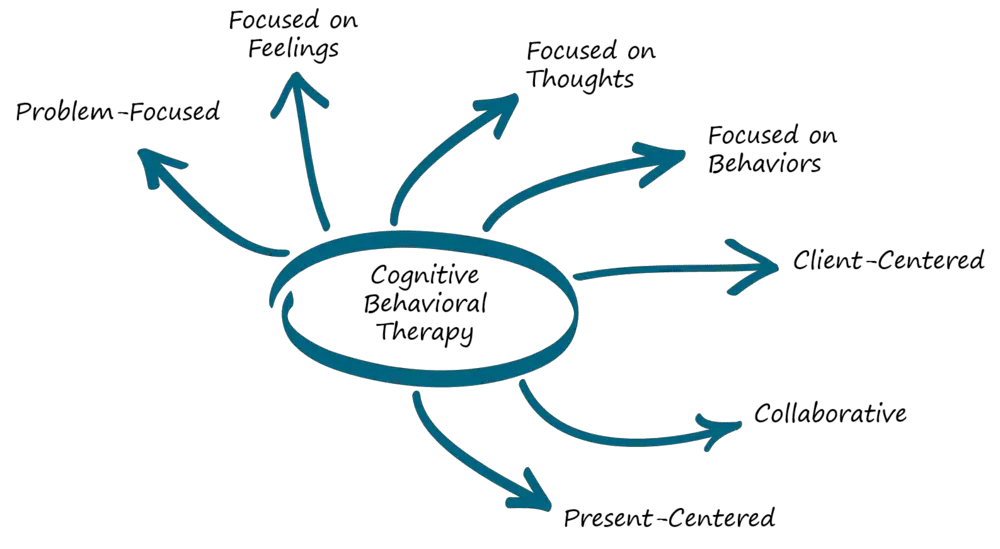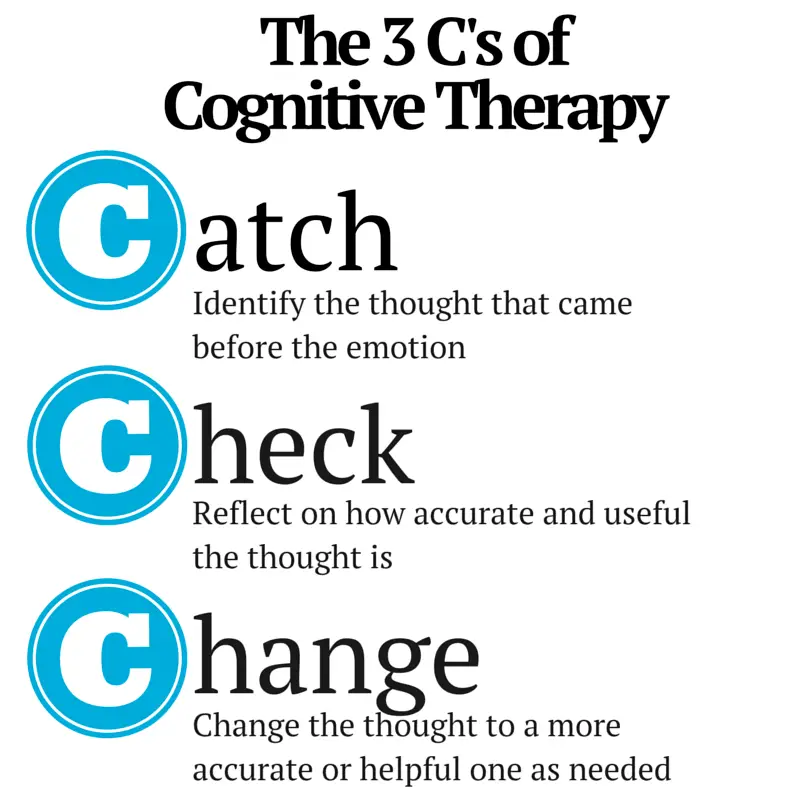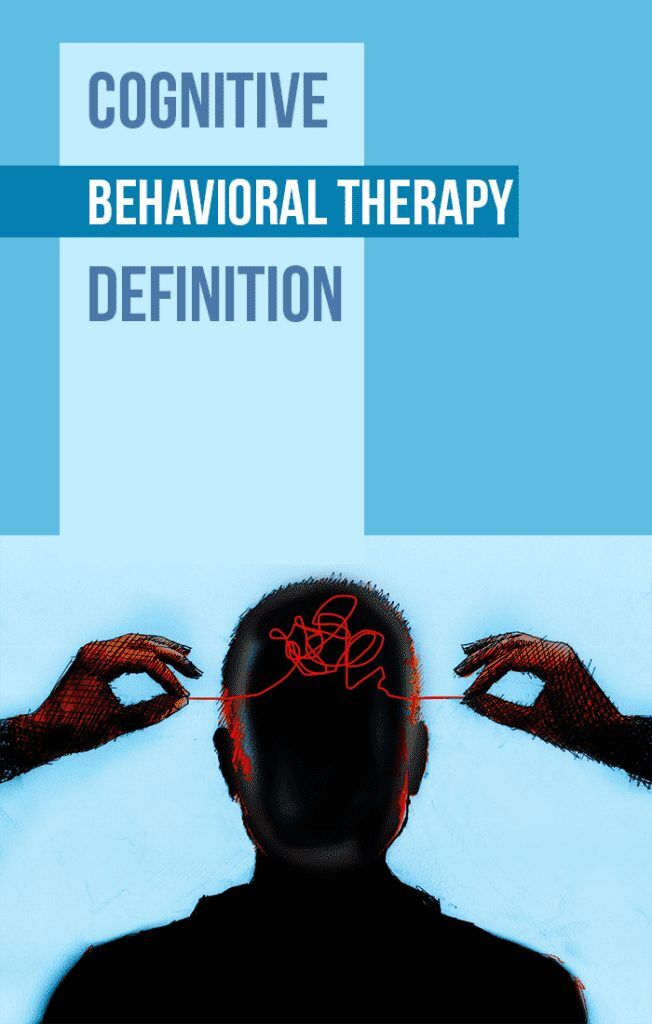Cognitive Behavioral Therapy Definition:
- Cognitive Behavioral Therapy (CBT) is a psychotherapy used to treat mental health disorders.
- CBT is a present-focused, problem-solving approach that takes into account thoughts and feelings.
CBT was first developed by psychiatrist Dr. Aaron Beck in the 1960s because he realized his patients were not improving even though they were following what he prescribed.
He found out that it wasn’t their behaviors but rather their thoughts about those behaviors which were causing them to feel worse over time.
Though there are different types of therapy available today, CBT is one of the most popular because it’s been proven to be effective.
There is good evidence CBT is great when treating anxiety, depression, sleep disorders, and eating disorders.
Cognitive Behavioral Therapy Definition

The layperson’s definition of Cognitive Behavioral Therapy is a form of psychotherapy that helps people change their thoughts and behaviors.
For example, perhaps you think “I’m not good enough” – this could be a belief stemming from past failures.
This thought then causes you stress when you are about to sleep, eat or get into a social situation. As a result of stress you are unable to sleep, you eat too much, and are awkward around people.
But what caused the stress in the first place? It was your belief and thought that you were a failure!
The troubles with sleeping, eating and being awkward all followed as a result of your beliefs!
This is the fundamental assumption of CBT – that your beliefs impact your behavior.
Now, oftentimes people don’t know what they believe or think in the dark recesses of their mind.
But CBT helps people understand these types of cognitions (beliefs).
With CBT, people change their beliefs through behavioral experiments and cognitive restructuring exercises.
The goal is for sufferers to simultaneously change the way they think about things and change their behavior.
Does this Cognitive Behavioral Therapy definition make sense to you? Let me know in the comments below!
Cognitive Behavioral Therapy Advantages
1 – Present Focused
CBT is unique because it focuses on the present instead of the past.
In comparison,other forms of therapy are about digging up how things happened in your past.
But CBT only tries to understand why you think or behave a certain way now, in the present moment.
For example, if someone has excessive worry, then they might compulsively check everything twice. This can be indicative of OCD and can add hours onto their day without them realizing it!
This worry will then result in not having time for sleep, eating, and socializing.
All because of these compulsive behaviors stemming from an irrational thought process!
In CBT you just focus on these thoughts and NOT where these thoughts came from.
With other therapies, a person might explore their childhood. Was your parent also an excessive worrier? Or there was abuse so you became anxious in response to trauma?
But CBT just focuses on the thoughts and beliefs themselves. It doesn’t directly focus on how you got those thoughts or beliefs – just that you realize them and fix them!
2 – Directly Challenging Beliefs

Other forms of therapy work differently with negative thoughts.
For example, in Acceptance and Commitment Therapy (ACT) a person works with their negative thoughts by trying to accept them and not trying to change them.
But in Cognitive Behavioral Therapy, a person tries to refute these types of thoughts! Because there is always some basis for the thought, even if it’s not logical or based on facts!
Another therapy is Dialectical Behavioral Therapy (DBT). In DBT a person will work with their thoughts by trying to find a balance between acceptance and change.
While there are pros to accepting your thoughts, sometimes it’s best to challenge beliefs. And that’s where CBT excels!
3 – Short Term
CBT also has an emphasis on short-term treatments rather than long-term ones like other forms of therapy.
Generally speaking there will only be between five to twenty sessions needed before CBT treatment is complete!
Other types of therapy will not specify an end date of treatment.
For example, if you’re working with a Freudian therapist you might explore childhood for years!
But in CBT you get a specific number of sessions and a specific deadline when therapy ends.
4 – Science

CBT is especially rooted in empirical science.
In fact, it’s the robust and empirical science supporting CBT which resonated with me when I discovered this approach years ago!
I could tell that CBT was a more effective form of therapy when I read the science.
CBT has been the subject of tons of research and it’s grounded in empirical data on its effectiveness over time. This means you have a highly effective treatment for your mind!
Science is important when we’re looking at CBT because this helps us decide whether it’s an effective treatment.
Plus, there are quite a few studies that have found CBT treatments to be more effective than other forms of therapy! And they also found the costs to be less expensive as well!
Here are a few studies that reviewed CBT:
- Check this meta-analysis of meta-analysis studies on Cognitive Behavioral Therapy. This synthesis about Cognitive Behavioral Therapy looked at 269 meta-analyses!
- “Meta-analysis of the effects of cognitive-behavioral therapy for binge-eating-type disorders” of over 27 studies found that “The percentage of treatment completers who achieved abstinence at post-treatment was 42.1%.”
5 – CBT Treats Many Problems
CBT is useful for many different situations.
Why is CBT so useful for different problems like anxiety, eating and sleep?
Because negative thinking causes a lot of the problems in the world!
Here is a great quote by Buddha to illustrate this point 🙂
“Our life is shaped by our mind; we become what we think. Suffering follows an evil thought as the wheels of a cart follow the oxen that pulls it”.
Because thoughts are the root of so many evils, the applications for CBT are nearly endless.
Cognitive Behavioral Therapy (CBT) has been shown to combat:
- anxiety disorders
- depression and negative thoughts
- eating disorders
- insomnia
- lack of assertiveness and boundary setting
- post-traumatic stress disorder
6 – Structure
CBT treatments usually involve self-monitoring by keeping a written record, a journal.
For example, someone with anxiety in CBT keeps a journal of when they get anxious.
Other times people who struggle with Binge Eating Disorder will write down their thoughts and feelings before they eat.
The nice thing about self-monitoring is you get a very stable structure within which to explore your thoughts.
By structure, I mean something you can look at and see tangible proof. Proof is sturdy like a structure because you can’t deny it!
For example, when someone keeps a record of their binge eating episodes, they start to see what they eat and how often they binge. This is tangible proof.
Other therapies don’t have people record their thoughts and feelings so there is less ‘structure’ so to speak.
If you struggle with food and would like to practice CBT for yourself, do check out the Eating Enlightenment Food Journal here!
7 – Individual Focused
Cognitive Behavioral Therapy targets individuals and their specific needs.
Again, the main goal when using Cognitive Behavior Therapy is to help the person learn how to identify thoughts that trigger negative emotions, such as anger or depression.
Then the next step is helping this person find ways of managing those thoughts to live healthier lives.
It’s this individual focus which can be really advantageous.
In other therapies like Family Therapy, you need to have the whole family present. Or in couples counseling you need your partner to take part or the therapy doesn’t really work!
Of course there are advantages to having the whole family together and working on issues together. And couples therapy is by definition two people! So these can be useful in certain situations.
But sometimes it’s best to really focus on yourself and fix yourself first!
8 – Familiarity
CBT is a form of Western therapy.
Even though you may never have heard of CBT before, the principles of CBT will seem familiar.
For example, one of my favorite books as a young adult was Napoleon Hill’s classic ‘How To Think and Grow Rich’.
This book emphasizes taking responsibility for your negative thoughts, as well as creating plans of action to make money!
A decade later when I stumbled upon CBT, I saw a lot of similarity!
Of course CBT isn’t used to make money per se, but in CBT you do take responsibility for your thoughts! And you also create plans of action to change your behavior!
Many CBT principles will be familiar if you grew up in a Western culture.
Other examples of familiar CBT principles include:
- Goal setting
- Motivation
- Self-care
- Problem-solving skills and technique
- Management of anxiety through relaxation techniques, such as breathing exercises or meditation.
History of CBT
The origins of CBT can be traced back to psychiatrist Aaron Beck in the 1960s.
Dr. Beck was instrumental in discovering how cognition impacts emotion and behavior.
But what we know as Cognitive Behavioral Therapy today is different from Beck’s original ideas.
Other people who have been influential in developing CBT are Albert Ellis and John R. Teasdale. Both of these guys modified Beck’s work to include more cognitive techniques.
Before CBT, you only had behavioral therapy. Behavior therapy is very flawed because it has no room for conscious thought. Everything is deterministic!
Fortunately, there was a revolution in the 1980’s where behavior therapy was discarded and other new forms of therapy like CBT could take root.
What we now know as ‘CBT’ is really an evolution of psychology, treatment and science ever since the 1960’s.
Conclusion To Cognitive Behavioral Therapy Definition
Cognitive Behavioral Therapy (CBT) has been proven to be effective for the treatment of many mental health conditions, such as depression and anxiety.
Overall, the Cognitive Behavioral Therapy definition is rooted in it’s numerous advantages including being short term and focusing on the present moment.
It also has specific techniques and worksheets geared towards changing behavior to alleviate symptoms of stress-related illness, like insomnia, eating disorders and so forth.
I am definitely biased towards Cognitive Behavioral Therapy, and I definitely recommend you give this approach a good shot!






My sister has a daughter that is struggling with anxiety. It was really interesting when you talked about how cognitive behavioral therapy can help with anxiety. My sister should consider looking for a counselor that can provide this form of therapy for her daughter.
For anxiety CBT especially good! Challenging thoughts / expectations plus exposure is great way to overcome anxiety. Thanks for the comment Henry
Best post to get the knowledge about CBT therapy and its benefits. Thanks for sharing it.
Thanks Irish!!
You post is absolutely deep and the best to know everything about CBT therapy. Thanks for sharing it.
Thanks so much Irish!! What did you learn about CBT?
This post is very easy to read and understand without leaving any details out. Great work! Thanks for sharing this valuable and helpful article.
Thanks Eugene, I appreciate the kind words!
What a wonderful post, you have put quite a lot of effort into this one, I can tell. Love everything about this, great post. Hope to see more such posts from you soon.
Thanks Michael! With time to relax the creativity flows!